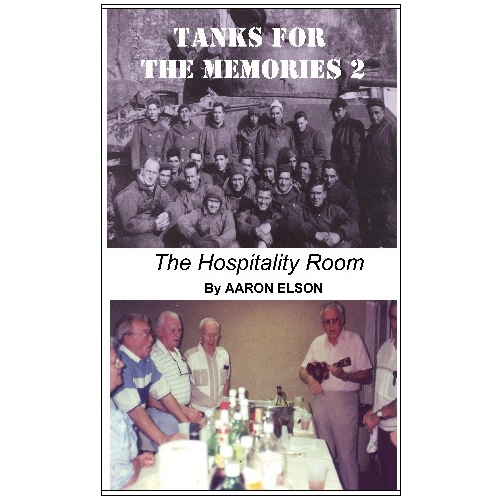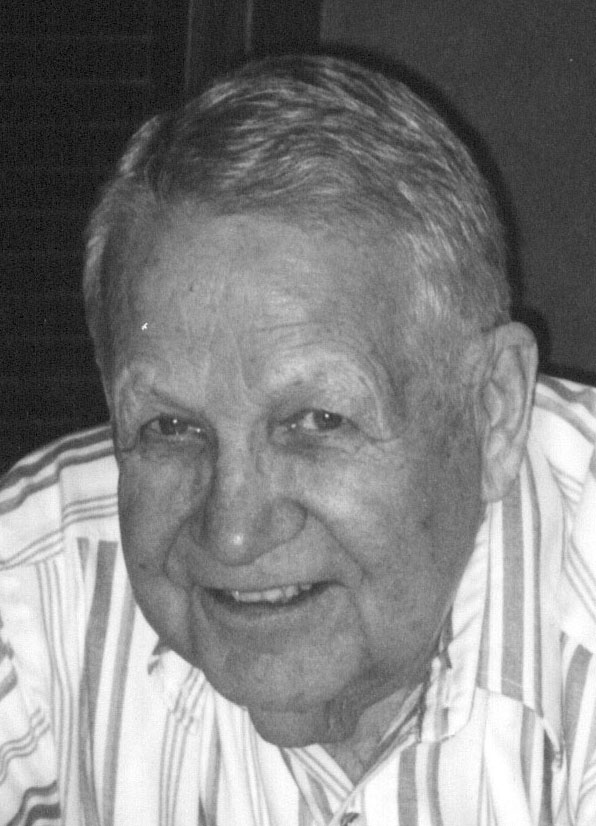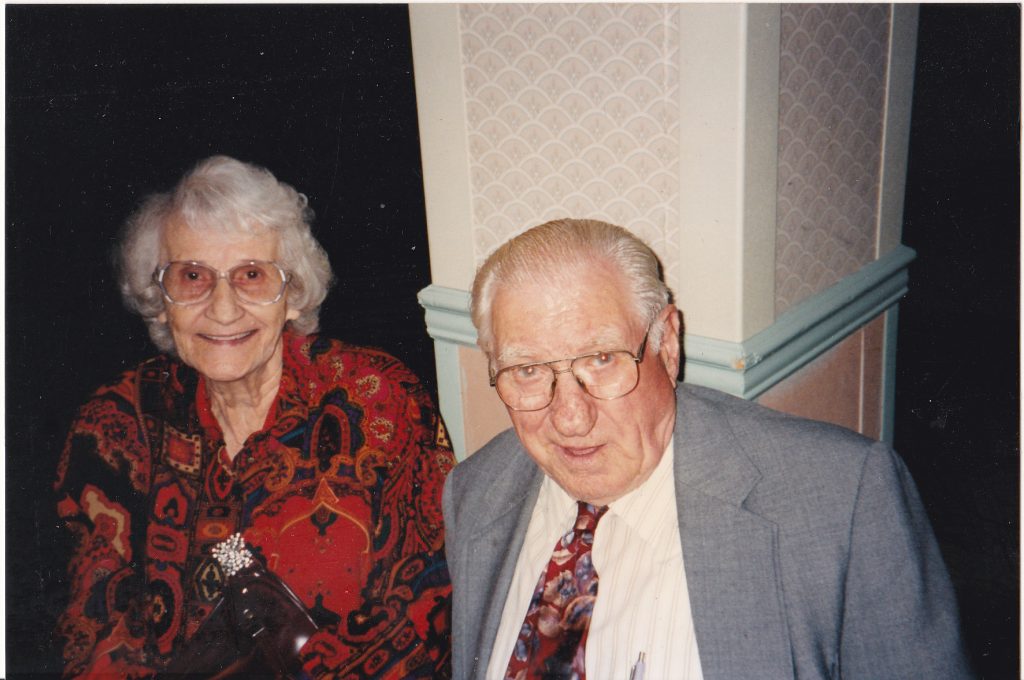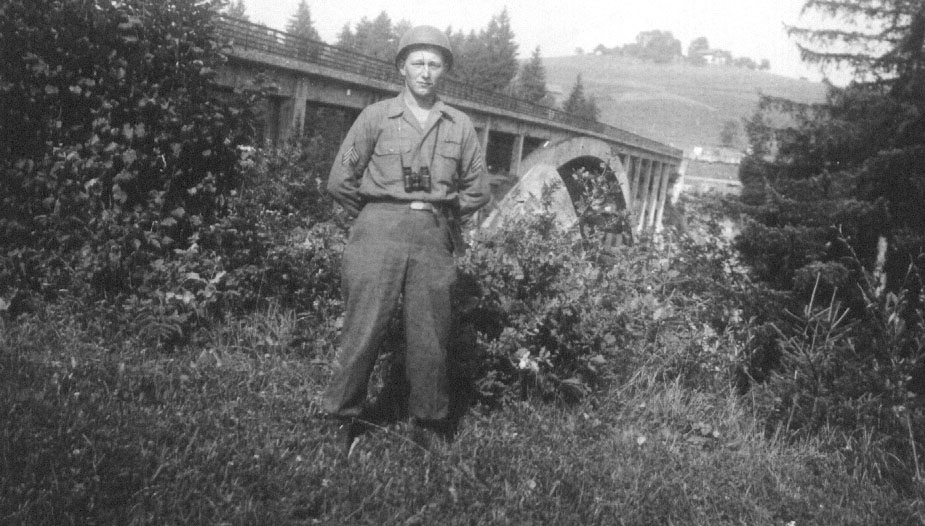
Everything was swell (excerpt)
In the hospitality room at the 1994 mini reunion in Bradenton, I spoke with Ellsworth Howard, who was wounded in the Falaise Gap and didn’t return to the battalion for several months. I had been hearing a lot about censored letters, so I asked him about it.
“All the mail that was coming back to the States had to be censored,” he said, “not for what personal things people had on their mind but what conceivably could be military things. So the way it was done, it was taken to wards in the hospital that had wounded officers in them. As we were in bed, we’d have a stack of mail dumped on us, and you had to read through all of it. You had to look over it for, a lot of times people tried to code things, had a little secret message of some kind. So you scan those things. And then you’re looking for anything that has to do with military action or people being killed or wounded. Nothing personal could be said.
“In order to find it, you had to read the whole letter, and I’ll tell you, the things people put in some of those letters, it’s just repulsive. You couldn’t censor that because it was personal. I mean, it had nothing to do with the military whatsoever, but intimate things. And in the most unbelievable ways that they’d express it.”
“Like pornography?”
“Oh, golly. Pornography’s mild compared to this sort of thing. And yes, they were just unbelievable. You just don’t realize that there’s as many people whose minds think like that. But it was an experience for me. Of course, people would think that they have no business reading that, but it goes in one ear and out the other, you don’t retain any of that. You don’t even know who the people are. If on the rare occasion you’d get a letter from someone you might identify a name, you’d give it to somebody else, so that you’re dealing with unknown. At least that was our experience. I don’t know how other people did it, but if I would ever run across a piece of mail from somebody I knew I would let somebody else handle it. I wouldn’t look at it.”
What did they talk about in the letters?”
“Oh, everything. They’d talk about everything from their food and how it’s fixed and how they prepare it, and what their 10-in-1 rations are like, or they might have had a letter from somebody else and they talk about family affairs, even to the point of one guy telling his wife that I’ve found somebody over here that I’m having sex with so I hope you’ve found somebody. Stuff like that.”
“That’s oddly honest,” I said.
“Sure. Of course he didn’t have any concern to us.”
“You didn’t censor that?”
“No.”

Going back, or forward, to the conversation with Joe and Mary Fetsch and Bob Bibb, another Service Company veteran, in which Joe talked about the neighbor’s son who was killed in the Battle of the Bulge, Mary said she was going to go and dig out Joe’s letters.
“I don’t think I wrote about it,” Joe said.
“What did you write about?” I asked.
“Oh, you’d be surprised,” Bibb said. “Half of them were cut up, weren’t they?”
“He’d say, ‘It was swell to hear from you,’ Mary said. “‘The weather is swell. All the guys are swell.’ Everything was swell.
“When we were moving to South Carolina, I said, ‘Joe, why don’t we throw all these letters away,’ because they didn’t mean anything to anybody except us. I have all the letters I got. Then we started reading them. Well, we laughed!”
I sat down for a conversation with John Zimmer, one of the unsung heroes of the 712th Tank Battalion reunions — he tirelessly contacted battalion members and next of kin, including the Wolfe twins, and even tried to get my father to come to a reunion — in the hospitality room at the 1992 mini in Bradenton, the first mini I went to. Every reunion John and his wife, Sylvia, would drive to from upstate New York. A member of C Company, he had a Nazi flag he picked up somewhere and brought to the reunions for battalion members to sign.

It would be some time after recording this conversation that I fully understood some of the things he referenced, so I’ll provide a little background. When he mentions the death of a tanker named Green, he’s referring to Larry Green, who was standing guard in the tank on the west bank of the Moselle River on March 14 of 1945 when a mortar round scored a direct hit on the turret. Zimmer had been cramped up in his tank much of the day and after crossing the river, went to an aid station, where he fell asleep and nobody woke him up. The next day, he missed the battle at Pfaffenheck, where Billy Wolfe and three other members of his platoon were killed.
“I was in that tank all afternoon, and boy, my kidneys were killing me,” Zimmer said. “They were shooting at us, dropping in mortars all the time, and one mortar hit a tank and killed a guy named Green. They was under observation where they were. The mortars would come in maybe two or three at a time, and they wouldn’t come in maybe for an hour. I know I just got into the tank and one came in.
“We had to wait for darkness to cross the Moselle. We got across, and this guy Snuffy, he was the platoon leader, he said, ‘Zimmer, I’ve got some medics right next door here,’ darker than pitch it was. He said, ‘If you want, you can see if they can help you.’
“So I went in. The guy asked me what I wanted. I said, ‘You know what I want to do for a few minutes? Lay down on the hard wood floor.’ Because I was cramped up all day in the tank. So I did. Jesus. I went to sleep. I was so damn tired. I went to sleep, and there was another guy went in with me, and when he went, he never called me. He never woke me up or anything. And when I woke up there was nobody there. The medic was gone, too.
“The next morning, they got the hell shot out of them, and I missed it.”

Zimmer then showed me a photo of Clarence Rosen, himself, Lloyd Seal and Leroy Campbell.
“There’s the guy that went in with me that I told you, he never told me to get up and get out.” He was pointing to one of the other three tankers. “He went back to the tank. They lost about four guys there.
“I was in C Company,” Zimmer said. “I’m 80 years old. I was 32 when I went in the service. I was 35 when I got out. I went in in ’43. I got corporal, that’s all. In Amberg, a guy come over and he said, ‘You want a stripe?’ And I says, ‘Aw, the hell with it. Give it to somebody else.’ I’ll tell you why: because I was the liaison between the camp laborers and the camp itself.”
“You went from Normandy all the way through?” I asked.
“All the way,” he said. “After we joined the 712th, right after the 4th of July when they got hell beat out of them, then we had practically a new platoon.”
“Were you in the action on Hill 122?”
“No, I wasn’t involved. That’s where they caught it, see. They brought in 40 guys, and I was one of them.”
“What’s it like inside a tank?” I asked.
“It’s just a big circle in there. We always carried a hundred rounds of ammunition. We had places to set it, but we always had a great big pile in there, stacked up. It was kind of hard to get around them, but we made it.
“We never fired too much. The time we had a chance to fire we got hit before we could fire, on September the 8th, ’44, we got knocked out.”
This was the battle with the 106th Panzer Brigade he was talking about, but like I said, this was 1992 and I still didn’t know a lot of names and dates and places.
“Thirteen German tanks came down this road,” he said, “and they spied us on a hill. Griffin got knocked out and we got knocked out. Out of five tanks, they got two of us. But the whole damn battalion was there. Them guys come down this road at night, pitch dark night, and when it got daylight, then they spied us.
“The tank where I was in got hit twice while I was in it, and twice after I got out of it. There was a ditch there and I got in the ditch and I saw it hit the second time after I got out.
“One guy was killed and one guy wounded bad. And I got out. I’ve got a scar on my leg, but that’s all. Because I was only about two feet away from the guy that got his legs all shot up. That was George Peck. He was a guy that came in with us. We had five new guys in the tank, green guys.”
“How many tanks did you have that were hit?” I asked.
“Two,” Zimmer said. “One got stuck. We got stuck in quicksand, sunk right down, just a little of the turret stuck out. We took all the guns out, and the firing pins out of the big gun, and left it.
“Then we got hit with a bazooka or a panzerfaust. We got hit in Luxembourg during the Bulge. A guy hit us and hit the track, knocked the track off. If it hadn’t been for that, we might not be here today, because that thing, if it hits the steel, it’ll blow right through and explode inside. But if it hits the air, it explodes. That’s why it hit the track, right out in the air. It came out of a cellar window.
“Well, we got hit, we was out of commission. The driver there was the driver in the picture, Leroy Campbell, a good soldier, but he couldn’t steer it. He ran it right into a manure pile. And the manure pile is a pile over a big hole, four foot deep, and that tank pushed it all down. And they couldn’t get it out with another tank. I guess they did get it out with two tanks hooked on it.
“As I say, we had a close call there. I was out of a tank for a couple of weeks and then we got a tank. I hated to see it come.
“That time we got hit, that was September the 8th, near Metz. The company kitchen was in the woods, parked. And I think the 90th Division got it, but we got a lot of it, beef. Hind quarters, front quarters, frozen. They’d bring it over to us and the kitchen would cut it up, and I helped grind it. I had a hand grinder, make hamburgers. Boy, we lived like kings there. The young French kids would bring us in tomatoes and onions. Yeah, give ’em gum, they’d bring everything.”
“How would you eat normally?” I asked.
“Well, I’ll give you an idea of what it was. Last year in school, each grade, they got them all together and they got a guy from each outfit, like I was in the Battle of the Bulge, and one from Vietnam, and Korea. And they asked questions, and you’d answer the questions.
“The guy next to me, he was in Pearl Harbor. In fact he was a veteran of Pearl Harbor. And he went over, they bought his passage over for this anniversary.
“Well, I told the kids, I said, ‘You know what I’d do if I was a millionaire? I would buy bumper stickers that said Remember Pearl Harbor and put ’em on every Toyota I could find.’ They laughed about that.
“Then another kid asked me, ‘How did you take a bath.’
“I says, ‘I didn’t.’ I said, ‘I didn’t take a bath for two months.’ They laughed over that.
“Hell, it was colder than hell, you know.
“I had a razor, but I didn’t shave either, for a couple of weeks. And I had a helmet, that I got it in Fort Knox, it had a big dent on the top, and I could set that thing right on the floor, fill it up with water. And I wish to hell I’d have brought it home. I could have got it. But I didn’t think about it then.
“The roughest one, I missed the roughest. That was, I told you, when the guy got killed while we was waiting to go across the Moselle. They got across, and that was where I went to sleep on ’em. Next morning they caught the hell out of them. They run into a bunch of, oh, what do you call them, SS. They don’t give up. They fight till they die. Well, I could have been in that one.
“I had a lot of close ones. We got a lot of small hits, small guns, but once, we was in a bunch, we got a barrage of artillery. It was coming in right and left, and knocked all the periscopes out. The driver couldn’t see nothing. And the tank commander, he had to stick his neck out, too.
“When I was a gunner, we done a lot of shooting with a .30-caliber. Jesus, I stepped on the wrong button — we had two solenoid buttons, one for the machine gun and one for the 75, it was a 76 then — and that went off and it hit a telephone pole, and boy, it could have killed a lot of guys. I was luckier than hell there.
“I never really could say I killed somebody. Like this guy here (pointing to a picture of Aaron “Souvenir” Brown). I don’t know if I could do that or not. He was behind the tank shooting an M-1 at these guys over in the woods, how far away they were I wasn’t there so I don’t know. That’s where, you know the Wolfe sisters, their brother was one of them that was killed there.
“They came to one reunion, that was Niagara Falls. I presented a plaque to them.”
“Did you ever see anyone get combat fatigue?” I asked.
“No … well, in one way I’ll tell you,” he said. “I come close to this deal. We was in a woods, and right from where I was in the woods they gave me a pass to Paris. I won it. They pulled my name out of a hat someplace. So they sent a guy to take my place in the tank. And they shelled that woods. They shelled it all night, and he went haywire. But I see they found him again. He lives in California. But he was out of sight for quite a long time. He was in my place, and boy, my tank commander, Bill Brown, said ‘Boy, am I glad to see you.” Those treebursts, it hits the trees and it all comes down.
“I was gone for four days. Greca went with me.
“But I tell you, that time the panzerfaust hit us and we hit on the manure pile and it sunk, they said ‘You guys stay there and guard it, and pick up the prisoners.’ And we had about 20 of them. And this Aaron Brown, this was after that episode, or was it before, I can’t remember. Anyway, he was in front of the column, I was behind, and all them Germans had hobnails, that’s a cobblestone street, and we didn’t know the password. I was scared our own men would shoot us. We got them down there, and this Aaron Brown, he stirred around the next morning, he found a ham. He pulled a ham out of a barrel, I bet the thing weighed fifty pounds. And we fried the ham on our, I had a German blowtorch that would shoot a blue stream out. It was made so you could set it down and it would shoot up. We had our mess kits, hold the mess kit over that, in five minutes you’d fry the ham. Then the kitchen moved in on us, they got the rest of the ham. This was during the Bulge.”
“What did you do before the war?” I asked.
“I hauled milk,” Zimmer said, “until I got drafted, and then after I got back I went into carpentry. That was Depression days. You know what we need? We need another Harry Truman. He’s the guy that put the kibosh on the Japs.”
“Were you married before the war?”
“No, after. We were married in 1947. We’ve got two kids, one 38 and one 43. My son is 6-4, my daughter, she could do anything when she was a kid. I worked for the village for a little while after I got out, and had an old truck, and I used to keep it up at the house. She had a horse. She used to drive this truck out to water the horse at night.
“I have five grandchildren, four girls and a boy. Two boys.”
“Do they ask about the war?” I asked.
“No. My son’s got a girl and a boy, and my daughter’s got two girls and a boy. My son, he was over in Germany from ’70 to ’72. He was over there during the ’72 Olympics, and he was right close, remember when the Jews got shot up? He was in the Army three years.”